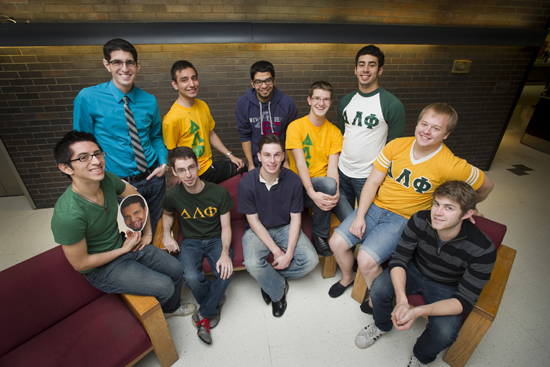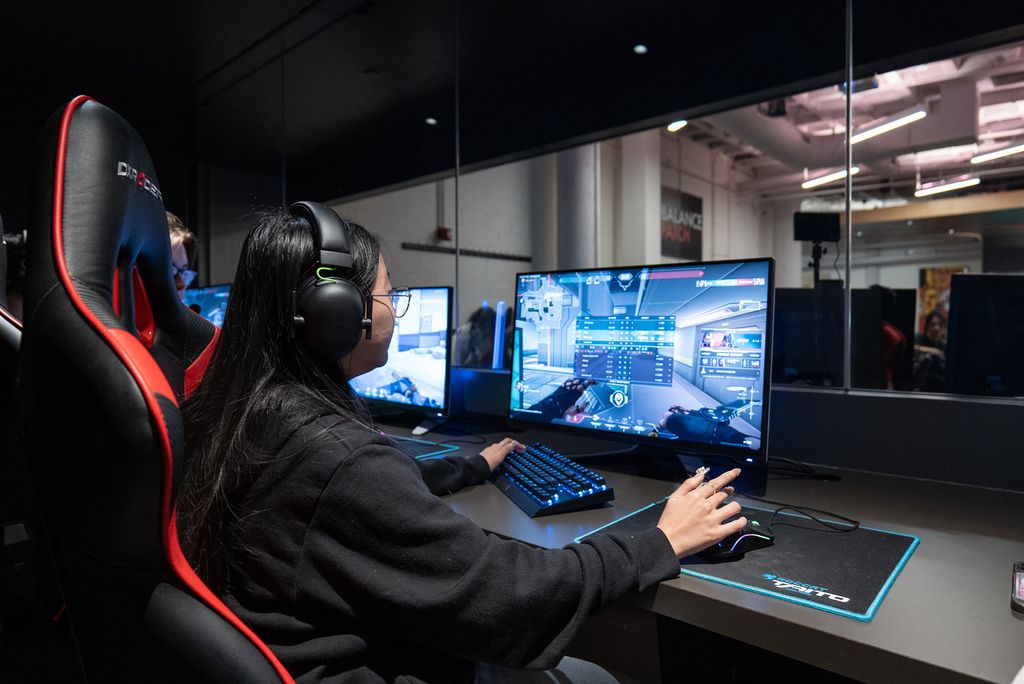A Fraternity Comes Back to Life
Delta Lambda Phi welcomes gay, bisexual, progressive men

The Delta Lambda Phi family: (back row, from left) Arcangelo Cella (CAS’11, LAW’14), Marcos Villarreal (CAS’13), Elliot Cintron (SMG’13), Stephen Arredondo (CAS’13), Ethan Pravetz (SED’12, CAS’12); (front row, from left) Arty Mendoza (COM’11) (holding a cutout of Kent State University mentor Bryan Guffey), Jonathan Dobres (CAS’05, GRS’12), Andrew McDonough (CAS’11, GRS’13), David Mark Orr (CAS’12), and Tom H. (ENG’12). Photo by Cydney Scott
Jonathan Dobres came to BU back in 2001 hoping to make new friends; what he found, he says, was a whole new family. His new siblings were members of Delta Lambda Phi, a social fraternity that welcomes gay, bisexual, and progressive members.
Now, a decade later, Dobres (CAS’05, GRS’12) is a graduate student at BU and one of two mentors for the fraternity’s new BU colony. Sitting in BU Central one recent afternoon, he is surrounded by half a dozen “little brothers,” who jokingly jab him about his age. Dobres plays along. He recalls the group’s first induction ceremony, in January 2011, when he worried that he wouldn’t be able to pick Arcangelo Cella (CAS’11, LAW’14) out from the crowd to give him his pin.
“And then, two months later,” he says, “I’m at his graduation crying because Angelo is graduating and probably leaving BU. I have friendships all across the country and some that go back that full decade. I don’t think that other gay organizations or gay student groups necessarily offer that kind of bond.”
Everyone at the table agrees. They are among the 15 alumni, active members, or pledges in the BU colony of DLP, which was founded in 1986 and now has 26 chapters and 6 colonies in the United States and Canada. Other than Delta Phi Upsilon, a Greek organization founded by gay men of color, DLP is the only nationwide fraternity for gay, bisexual, and progressive men.
“I think there’s a need for it in collegiate Greek life,” says Ethan Pravetz (SED’12, CAS’12), DLP’s BU president and pledge educator. “All fraternities have antidiscrimination clauses in their bylaws. Everyone’s willing to say that they don’t discriminate, but we’re trying to be leaders against the de facto discrimination that might occur.”
Cella still gets some double takes when he says he’s meeting with fraternity brothers. People say, “Wait, what? You are in a frat?” he says. “And it’s like, ‘Yes, we can do it too.’”
DLP members have a chance to change the image of the traditional fraternity man, says Raul Fernandez (COM’00), assistant director of the Howard Thurman Center. “You can’t just think about them as straight white males,” says Fernandez, who helped found BU’s chapter of the Latino fraternity Phi Iota Alpha. “It’s just not something you can do, at least not on this campus.”
DLP founded a Boston-wide chapter in 2001, but the group dwindled and was dissolved in 2007, a year before Pravetz arrived. By chance, the biology and science education major had Dobres as his teaching assistant freshman year and learned about DLP through its one-time fraternity president. Their conversations encouraged Pravetz to form an interest group, and by January 2011, DLP’s national board of directors had granted the first eight pledges colony status, the step before becoming a full chapter.
In fall 2011, the group completed its first rush, a monthlong effort with three weekly events—including a potluck and video game night to a screening of Clue and a marathon evening of ice cream, the Rocky Horror Picture Show, and a trip to IHOP.
Of the 18 students who rushed, 7 were accepted, among them Eric Linder (COM’15). “It was so unique,” he says. “I really hadn’t heard of anything like it before.”
DLP dubs itself a social fraternity, but members fund-raise and do community service for organizations like the Greater Boston Food Bank, Rosie’s Place, and Fenway Health, where they answer a hotline for LGBT (lesbian, gay, bisexual, and transgendered) people.
Pravetz says the fraternity fields a lot of misguided questions about sexual activity. “There’s this really weird assumption that there’s a large sexual aspect to what we do because we’re differentiating ourselves by sexual orientation,” he says. “The best answer I can give is that it’s a brotherly love that we have for each other.”
“The social aspect of the fraternity is about forming those genuine friendships,” says Dobres. “The sexual aspect of it really doesn’t enter into it at all.”
Besides, adds Cella, “if that’s what you were after, you wouldn’t have to do this much work.”
The group has been well received by other fraternities, and especially sororities. (“Can DLP just not be their gay best friend?” Cella asks in mock exasperation.) The Multicultural Greek Council has recognized the group as an official BU Greek letter organization. And although there are other LGBT groups on campus—like Spectrum, the Marsh Chapel’s LGBTQ group, and Q, the University’s queer activist collective—DLP men say the fraternity offers them unique opportunities to network nationally and to serve the local community.
Fraternal life “incorporates a lot of things that student groups might be able to do, but this rolls them into one experience for this community,” says Bryan Adams, coordinator of programs at the Student Activities Office.
Fernandez encourages DLP members to take advantage of the receptive audience at BU and rally more students to engage in LGBT events. “What makes an organization unique is not what they are, but what they do,” he says.
What DLP will do is still being determined. Pravetz and others are excited that they’re “getting in on the ground floor” to establish the traditions and partnerships for the next generation of brothers. “Pledge classes in the future will have to learn our names,” he says. “People will trace their family tree back to us.”
This Series
Also in
BU Clubs
-
October 27, 2023
Video: Skateboarding with BU Girls Skate
-
May 3, 2022
Promoting the Beauty of Natural Hair
-
April 27, 2022
Yes, BU Has an Equestrian Team. And It Just Had a Record Season

Comments & Discussion
Boston University moderates comments to facilitate an informed, substantive, civil conversation. Abusive, profane, self-promotional, misleading, incoherent or off-topic comments will be rejected. Moderators are staffed during regular business hours (EST) and can only accept comments written in English. Statistics or facts must include a citation or a link to the citation.